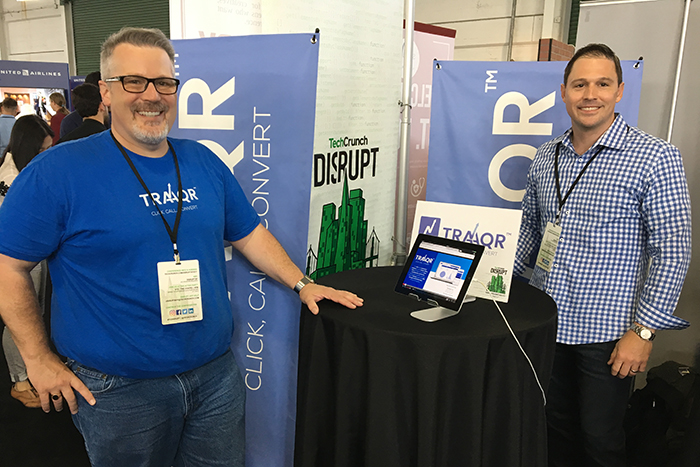
Last week, St. Louis-based startup Traaqr (pronounced tracker) announced the public release of their new product at San Francisco’s TechCrunch Disrupt.
Traaqr’s release marks the first fully-automated platform able to track online to offline call conversions with the same precision as e-commerce transactions. Brian Handrigan, co-founder and co-CEO of Traaqr, likened the problem to a company like Amazon being able to track their entire sales cycle from ad-click to shopping cart. But that level of tracking and accuracy didn’t already exist for companies whose sales are made through offline calls.
“[Online companies] have that advantage because the data has a chain of custody all the way through the process,” said Handrigan. “Businesses and their agencies have been forced to fly blind when it comes to online to offline conversions for years; this was unacceptable to us.”
Traaqr’s platform technology tracks calls, leads and sales, and takes the data and uploads it to ad platforms like Adwords in order to dynamically teach the ad platforms which clicks not only drive calls, but which clicks drive the most profitable sales.
The idea for Traaqr came from a real life problem that Handrigan and his co-founder and co-CEO, Jeff Linihan, were facing when they invested in a company that was making sales offline.
BECOME A SPONSOR
Join us in championing the narrative of success, resilience, and ingenuity that defines Nebraska’s startup community. Learn more »
“[The company was] doing 100% of its lead generation through online advertising and converting 100% of its sales on the phone,” said Linihan. “That business was spending upwards of $150,000 a month on digital advertising and places like google were [telling them to spend more to] generate more revenue.”
They didn’t have a good way to understand or know exactly which clicks were generating profitable sales and which were not. They tried a couple of existing products on the market that claimed to solve the problem, but they came up short.
“One we tried was an enterprise solution that was a 12 month minimum commitment and it cost about $3500 a month. We couldn’t even get off the ground without running into some major hiccups with those folks” said Linihan. “That’s when we decided to build our own technology to solve this problem. [After] we started getting positive reactions, we toyed with the idea of building a business around it.”

Turning Traaqr into a business led Handrigan and Linihan into an 18 month beta test where they collected data from users. Users saw a 34 percent reduction in monthly advertising costs, while increasing monthly sales by as much as 53.7 percent.
“That data comes from a very meaningful set of transactions,” said Linihan. “We achieved those kinds of savings and increases in revenue in almost 100,000 calls, 500,000 tracked web visits, approximately $900,000 in optimized digital advertising spend, and over $3 million in recorded conversion value.”
The biggest challenge they faced was getting Traaqr out of beta fast enough. Both co-founders have experience founding startups which allowed for their fundraising and development to go smoothly. But they still felt pressure from customers who wanted the product to launch faster.
“People were really interested in gaining access to this technology,” said Handrigan. “We still have to deliver and activate that, but the challenge was how fast can we deliver on this.”
Traaqr was one of eight companies selected by Accelerate St. Louis to join the Disrupt SF pavilion and represent their city alongside international entrepreneurs and startups. In total, Accelerate St. Louis sent 19 startups to events in San Francisco, Chicago and New York.
“The startup community has been one of the primary growth engines of the St. Louis economy over the past five years,” said Andrew Smith, vice president of entrepreneurship for the St. Louis Regional Chamber. “In many ways, the innovation story in St. Louis is our best, most authentic story.”
Handrigan and Linihan were grateful for the support.
“[The St. Louis Regional Chamber] is certainly contributing in a very positive way to the ecosystem” said Linihan. “People were surprised and pleased by what we had going on in St. Louis. It was good to get the name out.”
Even under pressure to deliver, the co-counders felt that waiting until Disrupt SF would be the perfect time to launch their platform because of the opportunities that would be available to make meaningful connections. That move paid off. Handrigan said they signed on some big customers that they’re hoping to announce soon.
Their success can also be attributed to their available price-point and desire to help others.
Handrigan and Linihan believe that every business has a right to access data of this quality in order to help be smarter, acquire more customers and hire more people, so they kept the entry price for the platform low.
“We price our product from $39,” said Handrigan. “Essentially, we’re providing a solution that’s better than the $1000+ priced solution, starting at the same price as the low-end products. We can still make a fair margin and make this available.”
––
Christine McGuigan is the Managing Editor of Silicon Prairie News.



